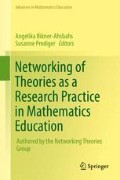Abstract
This chapter offers a critical appreciation of the networking project. It notes the origins of the participating theories in prior networking and draws out commonalities and contrasts in their pedagogical preoccupations. It highlights the opportunities that coordinated analysis and theory breakdown provide for elaboration of the participating theories and appropriation between them. Finally, it suggests that rather than conceiving synthesis in terms of an integration of theories, an alternative is to adopt a modular viewpoint which acknowledges the decomposability of theories into component analytic tools and the composability of tools from different theories.
Access this chapter
Tax calculation will be finalised at checkout
Purchases are for personal use only
References
Bourdieu, P. (1973). The three forms of theoretical knowledge. Social Science Information, 12(1), 53–80.
Radford, L. (2008). Connecting theories in mathematics education: Challenges and possibilities. ZDM – The International Journal on Mathematics Education, 40(2), 317–327.
Ruthven, K., Laborde, C., Leach, J., & Tiberghien, A. (2009). Design tools in didactical research: Instrumenting the epistemological and cognitive aspects of the design of teaching sequences. Educational Researcher, 38(5), 329–342.
Verret, M. (1975). Le temps des études. Paris: Honoré Champion.
Author information
Authors and Affiliations
Corresponding author
Editor information
Editors and Affiliations
Rights and permissions
Copyright information
© 2014 Springer International Publishing Switzerland
About this chapter
Cite this chapter
Ruthven, K. (2014). From Networked Theories to Modular Tools?. In: Bikner-Ahsbahs, A., Prediger, S. (eds) Networking of Theories as a Research Practice in Mathematics Education. Advances in Mathematics Education. Springer, Cham. https://doi.org/10.1007/978-3-319-05389-9_16
Download citation
DOI: https://doi.org/10.1007/978-3-319-05389-9_16
Published:
Publisher Name: Springer, Cham
Print ISBN: 978-3-319-05388-2
Online ISBN: 978-3-319-05389-9
eBook Packages: Humanities, Social Sciences and LawEducation (R0)

